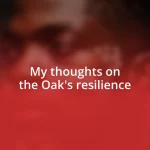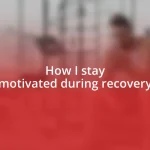Key takeaways:
- Understanding chronic fatigue involves recognizing its multifaceted nature, including mental clarity issues and emotional well-being, rather than just physical tiredness.
- Identifying physical, emotional, and environmental triggers of fatigue helps in managing chronic fatigue syndrome (CFS) effectively through awareness and adjustment of daily habits.
- Making lifestyle changes, seeking professional support, and incorporating mindfulness practices are essential for reclaiming energy and maintaining long-term well-being.

Understanding chronic fatigue
Chronic fatigue is more than just feeling tired; it’s like carrying a heavy backpack everywhere you go. I vividly recall days when even the simplest tasks felt monumental. Have you ever experienced that all-consuming level of exhaustion that makes you question your ability to get out of bed? It’s a nuanced condition that impacts not only energy levels but also mental clarity and emotional well-being.
For me, the frustrating part was not just the fatigue itself, but the lack of understanding from others. Friends would often say, “Just get some rest,” as if that simple solution could remedy my struggle. This experience left me feeling isolated at times, questioning if my fatigue was valid or if I was just being lazy. Do you resonate with that feeling of being misunderstood?
Understanding chronic fatigue requires digging deeper than surface-level symptoms. Through my journey, I’ve learned to recognize that it also manifests as memory lapses or brain fog. I remember attending a gathering, only to struggle to remember people’s names. It was disheartening. How many of you have felt similarly, where your mind just doesn’t seem to cooperate? Acknowledging these aspects can help you communicate your experience to others and find the support you truly need.
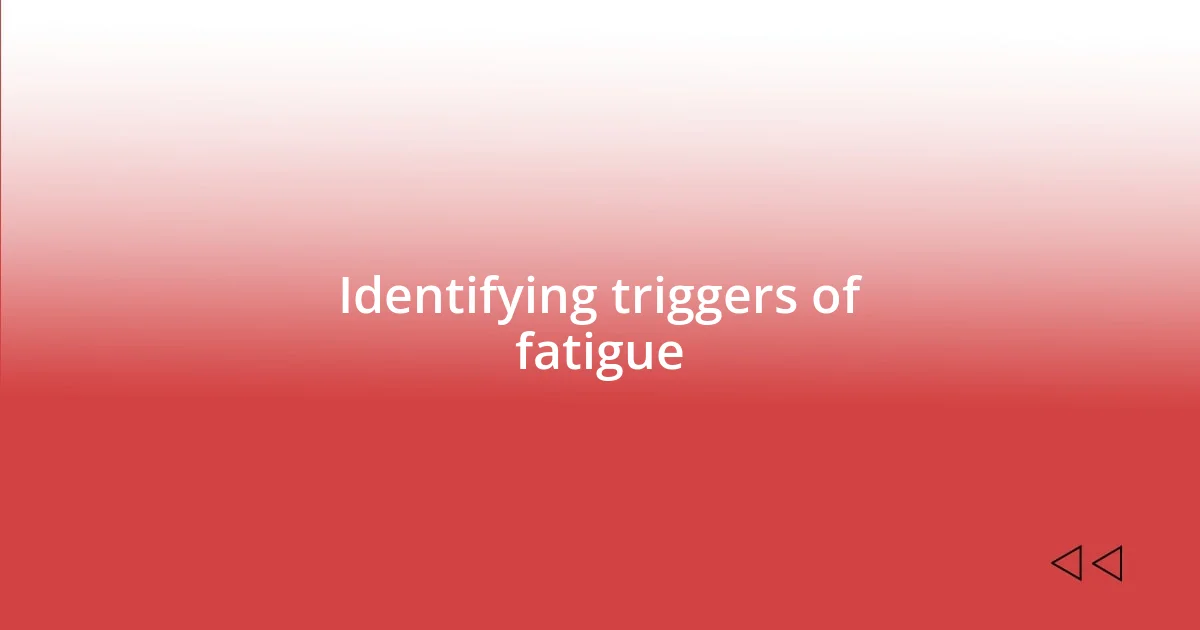
Identifying triggers of fatigue
Identifying the triggers of fatigue is crucial for understanding and managing chronic fatigue syndrome (CFS). In my experience, certain activities or even emotional states would send me spiraling into exhaustion. I remember times when a stressful day at work would leave me utterly drained, far beyond what I thought was possible. How can a single day affect your energy so profoundly? It’s important to keep a diary of your daily activities and feelings to pinpoint these triggers accurately.
I found that my fatigue wasn’t solely physical; emotional factors played a significant role. There were days when my mood would drop, leading to an unbearable heaviness. For instance, after a conflict with a friend, I felt completely depleted, as if I had run a marathon in my mind. This experience taught me that identifying triggers means looking beyond the obvious and being mindful of how our emotions interplay with fatigue.
Lastly, environmental factors also influence fatigue levels. I recall instances when a cluttered space made my energy plummet. It’s fascinating how something as simple as a messy room could drain me further. Have you experienced a similar phenomenon? Keeping your environment tidy and organized can sometimes help brighten your mood and elevate your energy.
| Trigger Type | Examples |
|---|---|
| Physical | Overexertion, lack of sleep, poor diet |
| Emotional | Stressful interactions, unresolved conflicts, anxiety |
| Environmental | Clutter, noise, uncomfortable surroundings |
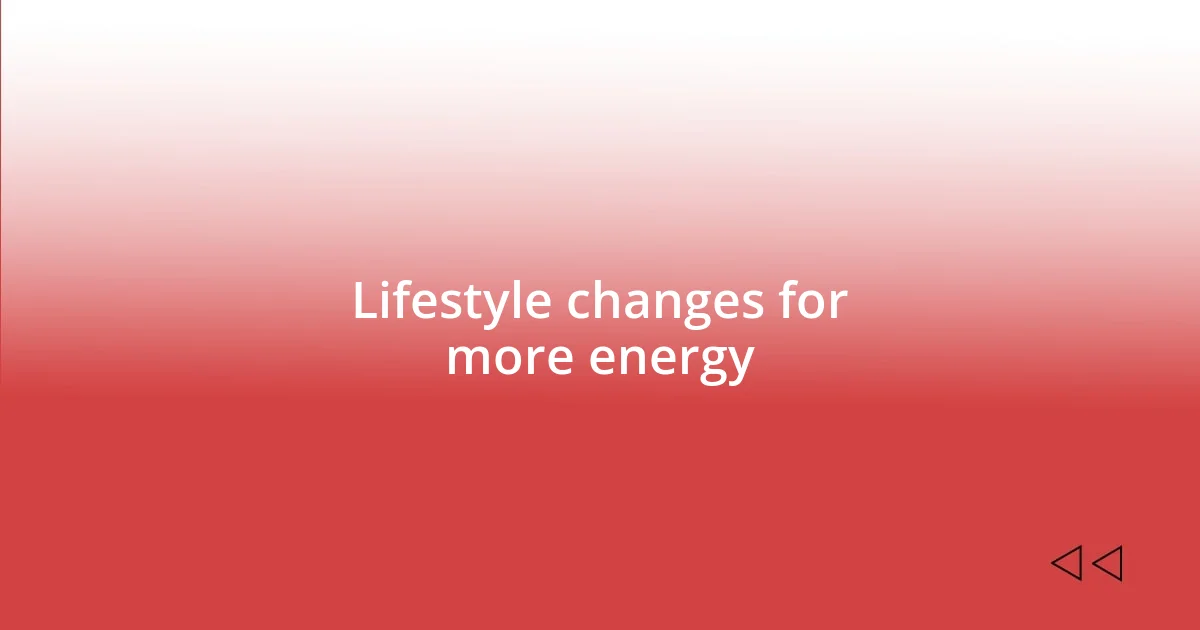
Lifestyle changes for more energy
Making lifestyle changes played a significant role in boosting my energy levels. I remember the moment I decided to embrace a routine that prioritized movement and nutrition; it was a lightbulb moment for me. Each morning, I started with gentle stretching and light exercise—nothing too intense—just enough to awaken my body. It genuinely felt like cracking a window open to let in fresh air.
Here are some lifestyle changes that can help you find more energy:
– Balanced diet: Focus on whole foods rich in nutrients. I incorporated more fruits, vegetables, and whole grains, and I noticed a shift in my energy levels.
– Regular sleep: Establish a consistent sleep schedule. When I began going to bed and waking up at the same time daily, my body thanked me with improved alertness.
– Hydration: Staying hydrated became a priority for me. I aimed for at least eight glasses of water a day, which made a noticeable difference in how I felt.
– Mindfulness activities: Engaging in meditation or yoga helped to clear my mind and reduce stress, allowing me to recharge emotionally.
– Breaks and pacing: I learned to break up tasks throughout my day. By avoiding back-to-back scheduling, I could take small breaks, which prevented me from feeling overwhelmed.
These adjustments didn’t happen overnight, but slowly, they turned into habits that contributed to a more energized version of myself. Each change was a step towards reclaiming my energy and reshaping my days.

Nutrition’s role in fatigue recovery
Nutrition plays an undeniable role in recovering from chronic fatigue, and I learned this firsthand. Early on in my journey, I discovered that a diet heavy in processed foods left me feeling sluggish and drained. When I made the switch to whole foods, including vibrant fruits and vegetables, I felt as if I had unleashed a wellspring of energy. How has what you eat affected your energy levels?
One morning, after enjoying a nutrient-dense breakfast—think oatmeal topped with bananas and almonds—I was pleasantly surprised by how much more energized I felt throughout the day. It’s interesting to note that macronutrients like proteins, fats, and carbohydrates can all impact our fatigue levels. I started paying closer attention to balancing my meals, ensuring I had sufficient protein to stabilize my energy and healthy fats to support my brain function. This made a tangible difference; I no longer experienced the mid-afternoon crash that had become all too familiar.
I’ve also learned that hydration is key for combating fatigue. In my experience, simply drinking enough water revitalized my energy. I made it a point to carry a reusable water bottle everywhere I went. It’s easy to forget to hydrate, but I found that when I didn’t drink enough, my mind felt foggy, and my body heavier. How has staying hydrated impacted your day-to-day activities? Emphasizing proper nutrition and hydration not only fueled my recovery but also transformed my overall well-being.
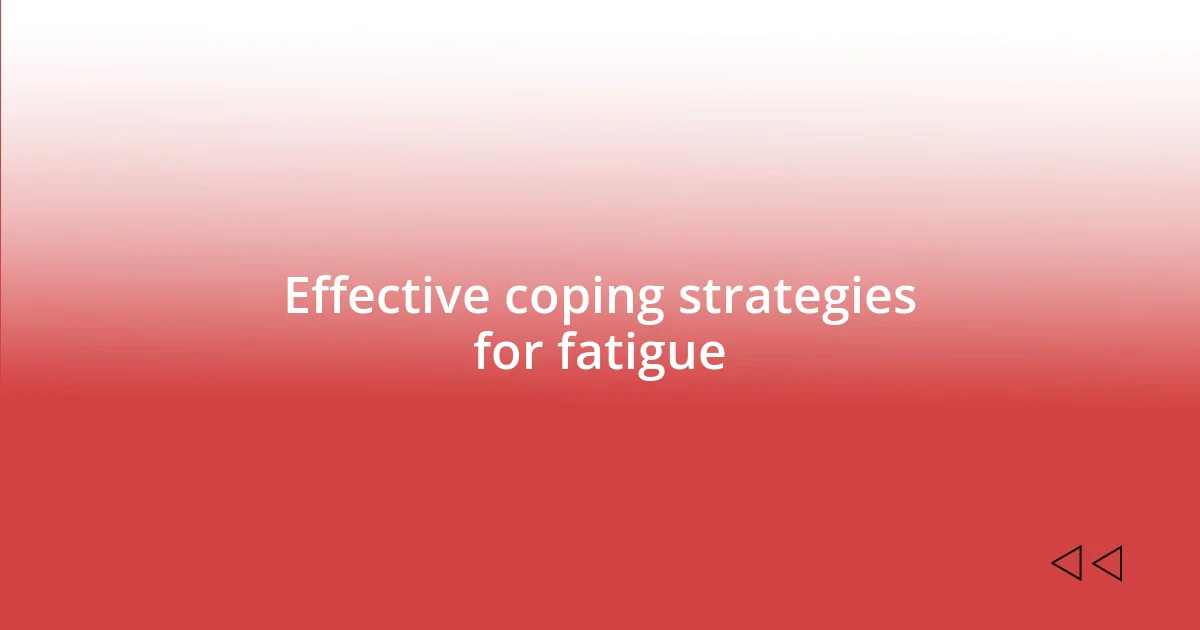
Effective coping strategies for fatigue
Finding effective coping strategies for fatigue has been a journey of discovery for me. One practice that really transformed my experience was learning to listen to my body. During particularly exhausting days, instead of pushing through, I gave myself permission to rest. I remember one day, overwhelmed by fatigue, I allowed myself a midday nap. When I woke up, I felt a wave of clarity and energy that I hadn’t experienced in a while—it was a gentle reminder that rest can be as crucial as activity.
Another key strategy was incorporating low-impact activities into my routine. I initially thought that exercise would drain me more, but gentle walks in nature became a refreshing escape. There was one memorable afternoon when I took a stroll at a local park, breathing in the crisp air while my mind cleared as the leaves crunched under my feet. It was such a simple act, yet it reinvigorated my spirit. Have you ever noticed how a little movement can change your whole mood? For me, these moments of connection with nature became a lifeline amidst fatigue.
Lastly, I discovered the importance of social connections in managing my energy levels. I started scheduling regular calls with friends, which often provided emotional uplift and a sense of normalcy. One evening, while sharing laughs over a video call, I could feel my worries melting away—it was like I was refueled just by being in that shared space, even from afar. How often do you prioritize social interactions? For me, these connections became a rich source of energy that supported my fight against fatigue.

Seeking professional support
Seeking professional support was a turning point in my journey to overcome chronic fatigue. I remember feeling overwhelmed and unsure about the next steps when my fatigue was at its peak. That’s when I decided to reach out to a specialist—an amazing decision that helped me gain clarity. Have you ever considered how a professional’s insights might change your perspective? For me, it was like shedding light on the shadows that had cloaked my experience.
During my sessions, I found it incredibly helpful to work with a therapist who specialized in chronic fatigue. One of our key discussions centered on the emotional toll fatigue had taken on me. I recall sharing how draining it felt to wake up every day with a mountain of fatigue, only to feel like I had to climb it alone. That conversation not only validated my feelings but also opened doors to new coping mechanisms I hadn’t explored. Engaging with someone who understood what I was going through made all the difference.
Additionally, connecting with a nutritionist allowed me to take a holistic approach to recovery. I’ll never forget the moment we dove into how my food choices were intertwined with my fatigue levels. It was eye-opening to realize some of the foods I relied on were actually sapping my energy. The support I received from these professionals was not just informative; it was a source of hope. Have you sought guidance to help you navigate your own challenges? Looking back, I see how that proactive approach changed everything for me.
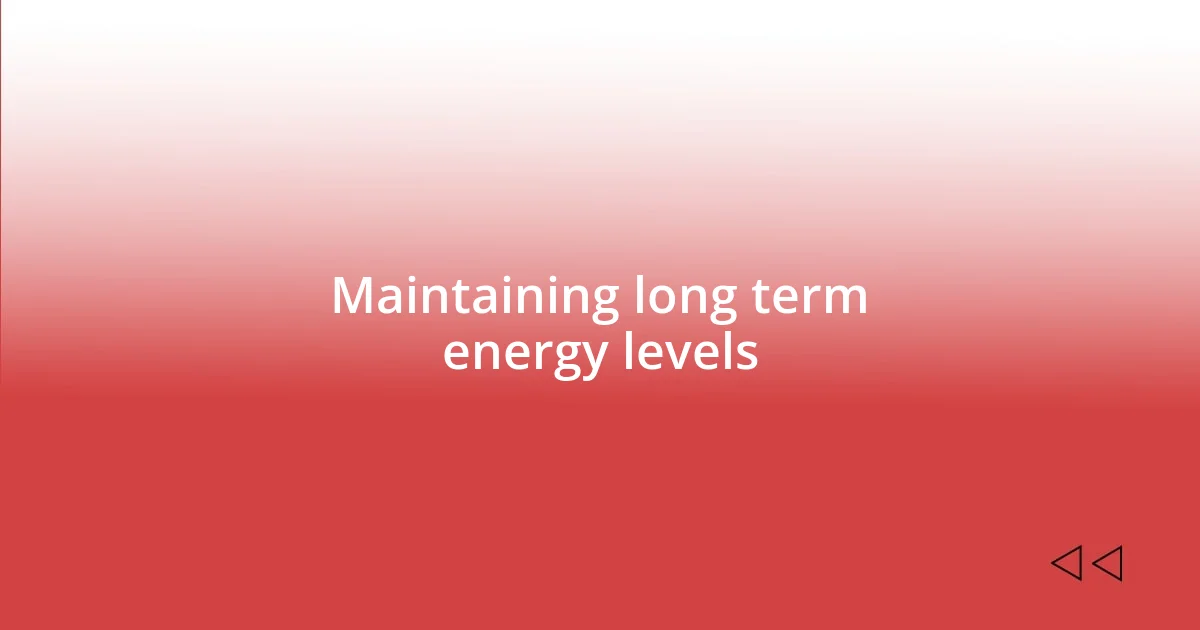
Maintaining long term energy levels
Maintaining long-term energy levels requires a delicate balance of self-care and intentionality. For me, monitoring my daily habits played a vital role. I started keeping a journal to track my energy fluctuations, which revealed patterns I hadn’t noticed before. I recall spotting a correlation between my hydration levels and how I felt. A simple habit, like drinking enough water throughout the day, made a noticeable difference. So, have you ever kept track of your daily rhythms? It might surprise you how much awareness can empower you.
Another significant factor in sustaining energy was the consistency I established in my sleep routine. I decided to prioritize going to bed and waking up at the same time every day, which had a profound impact on my overall energy. One night, after weeks of diligence, I woke up and realized I felt genuinely rested. It felt like a small miracle! When was the last time you felt that way? For me, this rhythm not only helped regulate my sleep cycles but also improved my mood and productivity.
Lastly, I embraced the art of mindfulness in my daily life. Incorporating short mindfulness practices, like deep breathing or meditation, transformed how I managed fatigue. I remember sitting quietly in my living room, focusing on my breath, and feeling my shoulders drop as tension melted away. Can you imagine how such moments could recharge your spirit? I found that these pauses became tiny sanctuaries in my day, allowing me to reset and harness my energy more effectively. Taking a moment to reconnect with myself became an invaluable tool in my journey toward maintaining energy.






